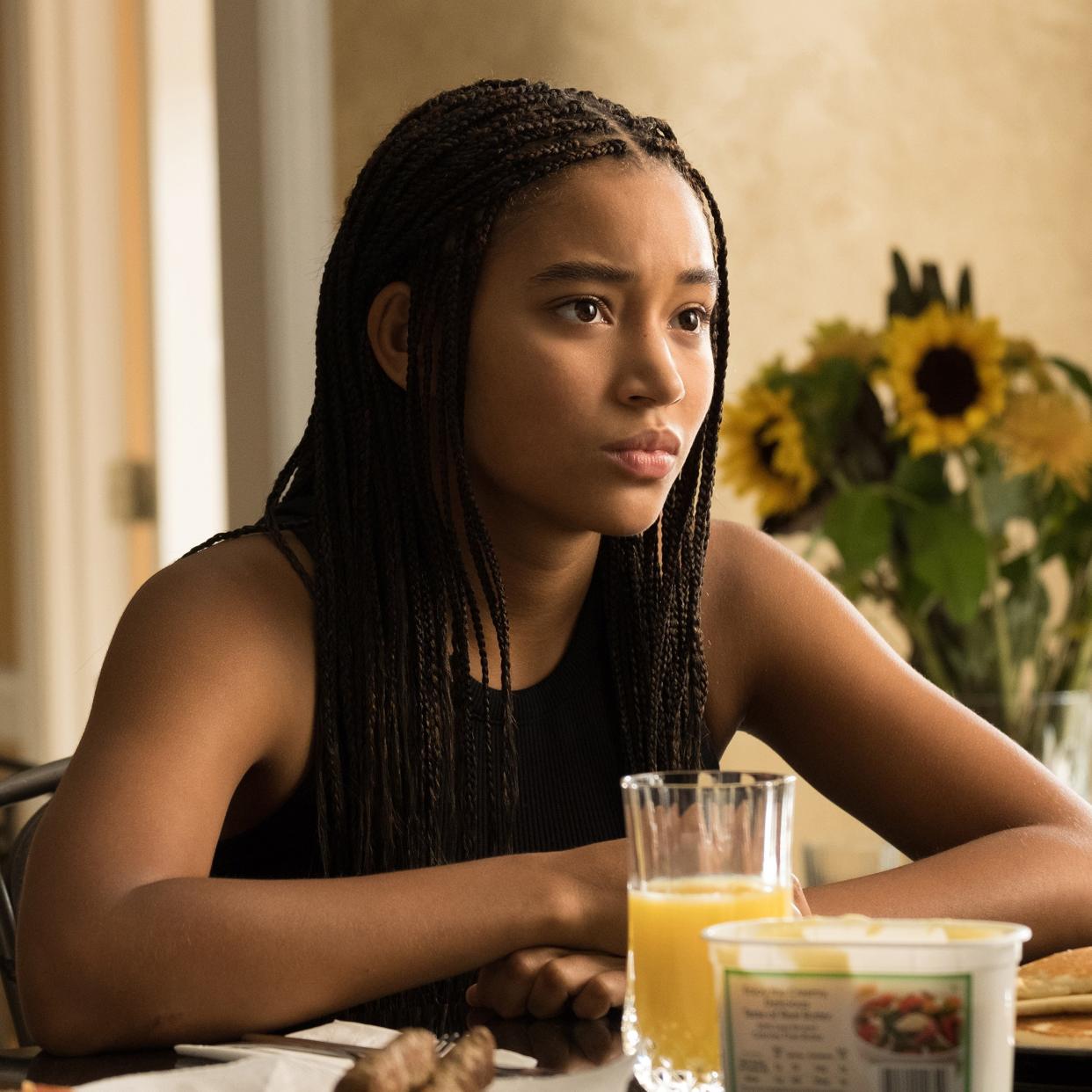The Hate U Give Is the Film That Black Girls Need Today

The Hate U Give is the film that black girls need today.
Teen movies are usually synonymous with budding romance, bothersome bullies, complicated familial relationships, and the overall drudgery of high school. While the genre attempts to give voice to a younger generation, it rarely prioritizes the perspectives of black girls. This is where The Hate U Give offers something different. The movie tackles many of the familiar teen-movie themes, but it also explores the complicated relationship between systemic racism and violence and examines their impact on coming-of-age as a young black woman.
“Having these kinds of movies matter,” 19-year-old Jacari Railey, a TV and film major at Howard University, tells Teen Vogue. “If our stories are stifled, we don’t have the chance to express ourselves.”
The Hate U Give tells the story of Starr Carter (Amandla Stenberg), a young black teenager who lives in the predominantly black community of Garden Heights, a neighborhood ruled by a local gang, but she attends an elite, white private school across town. At home, Starr can be herself, but at school, she does everything in her power to steer clear of being labeled the “ghetto black girl.” That means no slang, no hoodies, and no getting angry. Starr is often conflicted by having to navigate these two different worlds, and her reality becomes even more complicated when she witnesses her friend Khalil get murdered by a white police officer.
Suddenly, she is confronted by comments from kids at her school who claim that Khalil would’ve eventually been killed since he sold drugs to support his sick mother. Despite offering his support, even Starr’s white boyfriend Chris (KJ Apa) cannot relate to the threats that infiltrate Starr’s reality, and Starr is pressured to stay quiet by others in her community about Khalil’s death for fear of violent backlash from the local gang. On top of this, Starr is still navigating the challenges of a normal teenager, such as what to wear to prom and whether or not she should introduce her boyfriend to her parents.
“The message I took away from the film was to never give up on yourself and to speak up,” 14-year-old Rayna Moss tells Teen Vogue. Few movies are able to offer such a multifaceted view of the black experience — one that offers an unflinching look at the barriers that racism creates, the strong bonds that exist within a local community, and the challenge of finding your voice as a young person. Black girls need movies like this that speak to their unique experiences.
“I could relate to Starr’s situation,” adds Rayna. “I have family members that have sold drugs to financially support their family, and they ended up in jail. They believed that since there weren’t many job opportunities for them, they might as well start selling drugs. People are bringing drugs to our neighborhoods, so black people sell those drugs in order to survive.”
For others, Starr offers insight into what is often an isolating experience. Amber Cooper, 19, shares that she saw parts of herself in Starr. “I attended a predominantly white high school while living in an all black neighborhood,” Amber tells Teen Vogue. “Starr’s reality is common for many young girls my age, while we’re still struggling to figure out who we are.”
In the 1990s and early aughts, a handful of coming-of-age films, including Love and Basketball, Akeelah and the Bee, Spike Lee’s Crooklyn, and Our Song, starring teenaged Kerry Washington, featured adolescent black girls. Most recently, Disney’s 2018 adaptation of A Wrinkle in Time, directed by Ava Duvernay, cast the main character as a young black girl, played by Storm Reid. Otherwise, recent teen movies, like The Fault in Our Stars, The Edge of Seventeen, and The Kissing Booth have featured all-white casts. The current teen-movie landscape is largely devoid of black girls, unless they are depicted as the sidekick or best friend of a white character.
A study conducted by researchers from Boston University and Georgia State University found that black girls are more likely to encounter stereotypical images of themselves in media, and these representations have wide-reaching negative effects. For example, researchers found that these depictions caused teachers to focus on the social behavior of black girls rather than their academic performance. The survey’s findings suggest that black girls need more spaces and platforms where they can feel safe to navigate issues relating to identity.
“Being accurately represented in the media offers us a chance to understand each other,” says Jacari. “I get upset when I don’t see myself represented in the media because then I think that I’m the only one struggling with these issues. The message I took away from The Hate You Give is that we all have a voice. There’s so many people who try to hinder our voice, but it’s our job to stand up for what we think is right.”
Get the Teen Vogue Take. Sign up for the Teen Vogue weekly email.
Want more from Teen Vogue? Check this out:
[The Hate U Give Reckons With Staying Silent or Speaking Out Against Police Brutality](https://www.teenvogue.com/story/5-simple-ways-help-families-separated-border
Amandla Stenberg Said She's Seen a Lot of White People Cry During The Hate U Give

